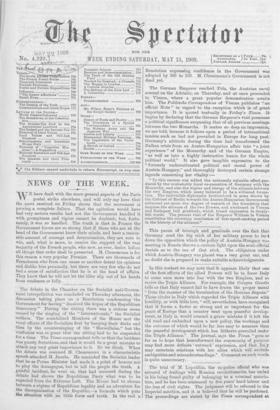The German Emperor reached Pola, the Austrian naval arsenal on
the Adriatic, on Thursday, and at once proceeded to Vienna, where a groat popular demonstration awaits him. The Politische Corresponclenz of Vienna publishes "an official Note " in regard to the reception which is of great importance. It is quoted textually in Friday's Times. It begins by declaring that the German Emperor's visit possesses a political significance surpassing that of all previous meetings between the two Monarchs. It makes so deep an impression, we are told, because it follows upon a period of international tension such as had not prevailed in Europe for long past.
Germany's attitude during the time had transformed the Balkan crisis from an Austro-Hungarian affair into "a joint experience " of the Monarchy and of the German Empire, "as well as into a highly instructive lesson for the whole political world." It also gave tangible expression to the " formerly underestimated political and moral power of Austria-Hungary," and thoroughly destroyed certain strange legends concerning her vitality:— •
" To this success was added the extremely valuable effect pro- duced by the unshakably loyal co-operation of Germany with the Monarchy, and also the vigour and energy of the alliance between the two Empires, which many believed to be a withered forma- tion. The indivisible diplomatic) brotherhood in arms shown by the Cabinet of Berlin towards the Austro-Hungarian Government enhanced yet more the degree of warmth of the friendship that inspires the alliance of the two Powers, and awakened in Vienna and Budapest full gratitude, which found expression in deeply- felt words. The present visit of the Emperor William to Vienna constitutes the crowning conclusion of this epoch-making period in the history of the alliance."










































